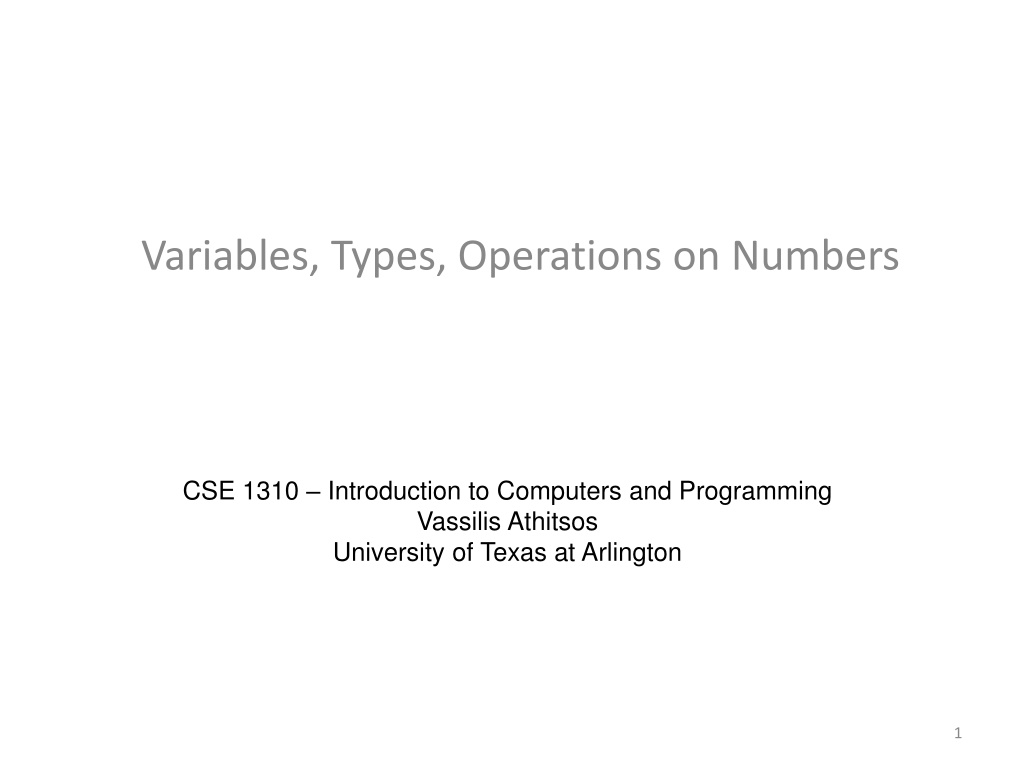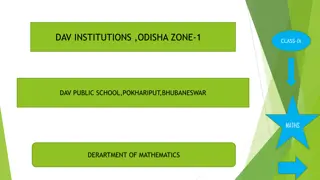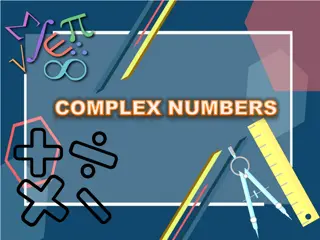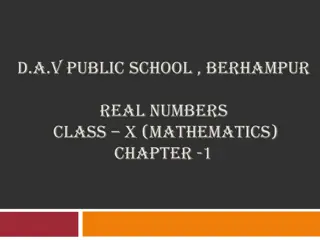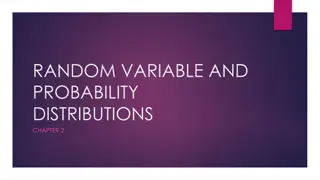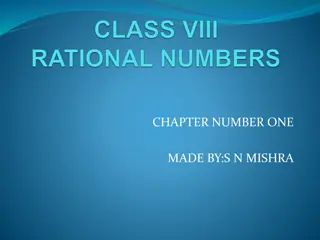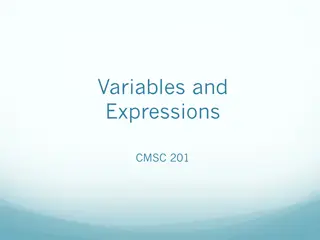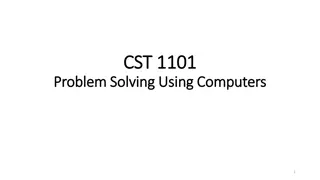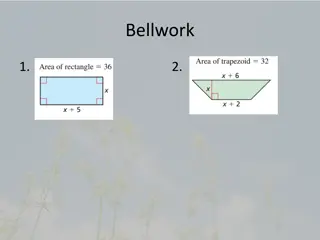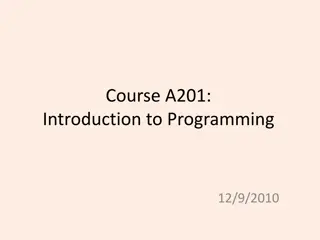Understanding Variables, Types, and Operations on Numbers in Programming
This resource provides a comprehensive overview of variables, types, and operations on numbers in programming. It covers variable declaration, initialization, common mistakes to avoid, and the correct usage of variables. Examples and images are included to enhance understanding.
Download Presentation

Please find below an Image/Link to download the presentation.
The content on the website is provided AS IS for your information and personal use only. It may not be sold, licensed, or shared on other websites without obtaining consent from the author. Download presentation by click this link. If you encounter any issues during the download, it is possible that the publisher has removed the file from their server.
E N D
Presentation Transcript
Variables, Types, Operations on Numbers CSE 1310 Introduction to Computers and Programming Vassilis Athitsos University of Texas at Arlington 1
Declaring a Variable At any point, you can create a variable, by doing a variable declaration. There are two ways to declare a variable: you can simply declare the type and name, or you can also provide an initial value. type variable_name; type variable_name = initial_value; For example: int x = 123; int number_of_fingers = 5; double radius = 20.231; 2
Declaration/Initialization before Use A variable must be declared before we try to use it. The code below illustrates a common mistake. Variable var is not declared anywhere. Java will refuse to run this code, complaining that it "cannot find symbol var". public class example1 // incorrect code { public static void main(String[] args) { var = 5; System.out.println(var); } } 3
Declaration/Initialization before Use A variable must be declared and initialized before we try to use it. The code below illustrates a common mistake. Variable var is declared but not initialized. Java will refuse to run this code, complaining that "variable var might not have been initialized". public class example1 // incorrect code { public static void main(String[] args) { int var; System.out.println(var); } } 4
Declaration/Initialization before Use One way to fix such problems is to provide an initial value for the variable at the same line where you declare the variable. The code below shows an example of doing that. The line shown in red declares and initializes a variable called var. public class example1 // correct code { public static void main(String[] args) { int var = 5; System.out.println(var); } } 5
Declaration/Initialization before Use Another way is to first declare the variable in one line, and then set the value of the variable in another line. The code below shows an example of doing that. The first line shown in red declares a variable called var. The second line shown in red sets the value of var to 5. public class example1 // correct code { public static void main(String[] args) { int var; var = 5; System.out.println(var); } } 6
Using Variables public class hello1 // incorrect code { public static void main(String[] args) { radius = 20.231; area = Math.PI * Math.pow(radius, 2); System.out.println(area); } } What is wrong with this code? 7
Using Variables public class hello1 // incorrect code { public static void main(String[] args) { radius = 20.231; area = Math.PI * Math.pow(radius, 2); System.out.println(area); } } What is wrong with this code? Variables "radius" and "area" are not declared. 8
Using Variables public class hello1 // correct code { public static void main(String[] args) { double radius = 20.231; double area = Math.PI * Math.pow(radius, 2); System.out.println(area); } } Corrected version. 9
Using Variables public class hello1 // incorrect code { public static void main(String[] args) { double area = Math.PI * Math.pow(radius, 2); double radius = 20.231; System.out.println(area); } } What is wrong with this code? 10
Using Variables public class hello1 // incorrect code { public static void main(String[] args) { double area = Math.PI * Math.pow(radius, 2); double radius = 20.231; System.out.println(area); } } What is wrong with this code? Variable "radius" is used before it has been declared. 11
Using Variables public class hello1 // correct code { public static void main(String[] args) { double radius = 20.231; double area = Math.PI * Math.pow(radius, 2); System.out.println(area); } } Corrected version. 12
Using Variables public class hello1 // incorrect code { public static void main(String[] args) { double radius = 20.231; double area = Math.PI * Math.pow(Radius, 2); System.out.println(area); } } What is wrong with this code? 13
Using Variables public class hello1 // incorrect code { public static void main(String[] args) { double radius = 20.231; double area = Math.PI * Math.pow(Radius, 2); System.out.println(area); } } What is wrong with this code? Variable "radius" is misspelled in the line where the area is computed. 14
Using Variables public class hello1 // correct code { public static void main(String[] args) { double radius = 20.231; double area = Math.PI * Math.pow(radius, 2); System.out.println(area); } } Corrected version. 15
Using Variables public class example1 // incorrect code { public static void main(String[] args) { int x = 5; int x = 3 * 5; System.out.println(x); } } What is wrong with this code? 16
Using Variables public class example1 // incorrect code { public static void main(String[] args) { int x = 5; int x = 3 * 5; System.out.println(x); } } What is wrong with this code? Variable x is being declared twice. 17
Using Variables public class example1 // correct code { public static void main(String[] args) { int x = 5; x = 3 * 5; System.out.println(x); } } Corrected version. 18
Types To declare a variable, you must specify the type of that variable. type variable_name; type variable_name = initial_value; The type of a variable defines what are legal values for that variable. Java will never allow you to set a variable to a value incompatible with the type of the variable. 19
The Five Basic Types In this course, our main goal is to learn how to write programs that do basic processing of data. The only data we care about in this course are numbers and text. To work with data and text, we will use five basic types. int double boolean String char 20
The Five Basic Types int legal values? integers, like 0, 57, -1896 double legal values? real numbers, like 3.0, 5.2, -0.23 boolean legal values? only two: true and false. String legal values? text, like "hello", "a cat jumped on the table", NOTE: text for strings must be enclosed in double quotes. char legal values? singe characters, like 'c', '3', 'A', '#', NOTE: text for chars must be enclosed in single quotes. 21
Types Are NOT Interchangeable A common mistake for beginners in programming is to not pay attention to types. Only beginners make this mistake. You will not make it past beginner stage as long as you make this mistake. The following four values are NOT interchangeable: 2 2.0 "2" '2' Why? 22
Types Are NOT Interchangeable A common mistake for beginners in programming is to not pay attention to types. Only beginners make this mistake. You will not make it past beginner stage as long as you make this mistake. The following four values are NOT interchangeable: 2 this is an int 2.0 this is a double "2" this is a string '2' this is a character Why? Because they are different types. 23
Types Are NOT Interchangeable For example: If you write "2.5" when you should be writing 2.5, your code will not work. If you write 5 when you should be writing '5', your code will not work. If you write 2 when you should be writing 2.0, your code will not work. If you write "true" when you should be writing true, your code will not work. 24
Types Are NOT Interchangeable For example: Incorrect Correct String a1 = 2.5; String a1 = "2.5"; double a2 = "2.5"; int num = '5'; double a2 = 2.5; int num = 5; char c1 = 5; char c1 = '5'; String str = '5'; String str = "5"; int my_int = 2.0; int my_int = 2; boolean v = "true"; String v = true; boolean v = true; String v = "true"; 25
The ++ and -- Operators public class example1 { public static void main(String[] args) { double x = 5.5; x++; System.out.println(x); int y = 4; y--; System.out.println(y); } } Output 6.5 3 The ++ operator increments the value of a variable by 1. Syntax: variable_name++; The -- operator increments the value of a variable by 1. Syntax: variable_name--; 26
The ++ and -- Operators public class example1 { public static void main(String[] args) { double x = 5.5; x++; System.out.println(x); int y = 4; y--; System.out.println(y); } } Output 6.5 3 The following two lines do the EXACT SAME THING: variable_name++; variable_name = variable_name + 1; The following two lines do the EXACT SAME THING: variable_name--; variable_name = variable_name - 1; 27
The ++ and -- Operators public class example1 { public static void main(String[] args) { double x = 5.5; x = x+1; System.out.println(x); int y = 4; y = y-1; System.out.println(y); } } Output 6.5 3 An alternative version of the previous program, without using ++ and --. Whether you use ++ and -- or not is entirely up to you. However, you should understand what they do when you see them in code. 28
The += and -= operators public class example1 { public static void main(String[] args) { double x = 5.5; x += 3.2; int y = 20; y -= 5; System.out.println(x); System.out.println(y); } } Output 8.7 15 The += operator adds some value to a variable. Syntax: variable_name += value; The -= operator subtracts some value from a variable. Syntax: variable_name -= value; 29
The += and -= operators public class example1 { public static void main(String[] args) { double x = 5.5; x += 3.2; int y = 20; y -= 5; System.out.println(x); System.out.println(y); } } Output 8.7 15 The following two lines do the EXACT SAME THING: variable_name += value; variable_name = variable_name + value; The following two lines do the EXACT SAME THING: variable_name -= value; variable_name = variable_name - value; 30
The += and -= operators public class example1 { public static void main(String[] args) { double x = 5.5; x = x + 3.2; int y = 20; y = y - 5; System.out.println(x); System.out.println(y); } } Output 8.7 15 An alternative version of the previous program, without using += and -=. Whether you use += and -= or not is entirely up to you. However, you should understand what they do when you see them in code. 31
Multiple Ways to Add/Subtract 1 If we want to add 1 to x, in how many ways can we do it? If we want to subtract 1 from x, in how many ways can we do it? 32
Multiple Ways to Add/Subtract 1 If we want to add 1 to x, in how many ways can we do it? x++; x += 1; x = x+1; If we want to subtract 1 from x, in how many ways can we do it? x--; x -= 1; x = x-1; 33
Converting Doubles to Ints public class example1 { public static void main(String[] args) { double price = 18.53; int dollars = price; System.out.printf("Rounded price: %d dollars", dollars); } } The above code gives an error: 34
Converting Doubles to Ints public class example1 { public static void main(String[] args) { double price = 18.53; int dollars = price; System.out.printf("Rounded price: %d dollars", dollars); } } The above code gives an error: Java does not allow assigning a double value to an int variable. There are several ways to get around that. 35
Converting Doubles to Ints public class example1 { public static void main(String[] args) { double price = 18.53; int dollars = (int) price; System.out.printf("Rounded price: %d dollars", dollars); } } First approach: casting. Putting (int) in front of the double value asks Java to convert that value to an integer. Casting simply removes the decimal part. (int) 18.53 evaluates to 18. (int) -18.53evaluates to -18. 36
Converting Doubles to Ints public class example1 { public static void main(String[] args) { double price = 18.53; int dollars = (int) Math.round(price); System.out.printf("Rounded price: %d dollars", dollars); } } Second approach: rounding. Math.round(number) rounds number to the closest integer. We still need to put (int), to convert the result of Math.round into an integer. (int) Math.round(18.53) evaluates to 19. (int) Math.round(-18.53)evaluates to -19. 37
Converting Doubles to Ints public class example1 { public static void main(String[] args) { double price = 18.53; int dollars = (int) Math.floor(price); System.out.printf("Rounded price: %d dollars", dollars); } } Third approach: rounding down (taking the floor). Math.floor(number) rounds number down to an integer. We still need to put (int), to convert the result of Math.floor into an integer. (int) Math.floor(18.53) evaluates to 18. (int) Math.floor(-18.53)evaluates to -19. 38
Converting Doubles to Ints public class example1 { public static void main(String[] args) { double price = 18.53; int dollars = (int) Math.ceil(price); System.out.printf("Rounded price: %d dollars", dollars); } } Fourth approach: rounding up (taking the ceiling). Math.ceil(number) rounds number up to an integer. We still need to put (int), to convert the result of Math.ceil into an integer. (int) Math.ceil(18.53) evaluates to 19. (int) Math.ceil(-18.53)evaluates to -18. 39
Constant Variables public class example1 { public static void main(String[] args) { int weeks = 12; final int days_per_week = 7; int days = weeks * days_per_week; System.out.printf("%d weeks = %d days\n", weeks, days); } } Some variables should never change value. Examples: Number of days in a week. Mathematical constants such as pi, e. Physics constants like Newton's constant for gravity. 40
Constant Variables public class example1 { public static void main(String[] args) { int weeks = 12; final int days_per_week = 7; int days = weeks * days_per_week; System.out.printf("%d weeks = %d days\n", weeks, days); } } If you want to tell Java that a variable is a constant, you use the final keyword when you declare the variable. Syntax: finaltype variable_name = value; 41
Constant Variables public class example1 { public static void main(String[] args) { int weeks = 12; int days_per_week = 7; int days = weeks * days_per_week; System.out.printf("%d weeks = %d days\n", weeks, days); } } What changes in the behavior of this program if we remove the final keyword? 42
Constant Variables public class example1 { public static void main(String[] args) { int weeks = 12; int days_per_week = 7; int days = weeks * days_per_week; System.out.printf("%d weeks = %d days\n", weeks, days); } } What changes in the behavior of this program if we remove the final keyword? Nothing. Then, why should we ever use it? 43
Constant Variables public class example1 { public static void main(String[] args) { int weeks = 12; final int days_per_week = 7; int days = weeks * days_per_week; System.out.printf("%d weeks = %d days\n", weeks, days); } } What changes in the behavior of this program if we remove the final keyword? Nothing. Then, why should we ever use it? It is good programming practice: it makes code easier to read and understand, and prevents human errors. 44
Example Where final Is Useful public class example1 { public static void main(String[] args) { int days_per_week = 7; int weeks = 12; days_per_week++; int days = weeks * days_per_week; System.out.printf("%d weeks = %d days\n", weeks, days); } } What do you think will happen with this code? 45
Example Where final Is Useful public class example1 { public static void main(String[] args) { int days_per_week = 7; int weeks = 12; days_per_week++; int days = weeks * days_per_week; System.out.printf("%d weeks = %d days\n", weeks, days); } } What do you think will happen with this code? Java will run it, and it will give the wrong answer (12 weeks have 96 days). The days_per_week++ should not have happened, probably the programmer put it there by accident. However, Java cannot possibly know that it was a mistake. 46
Example Where final Is Useful public class example1 { public static void main(String[] args) { final int days_per_week = 7; int weeks = 12; days_per_week++; int days = weeks * days_per_week; System.out.printf("%d weeks = %d days\n", weeks, days); } } What do you think will happen with this code? 47
Example Where final Is Useful public class example1 { public static void main(String[] args) { final int days_per_week = 7; int weeks = 12; days_per_week++; int days = weeks * days_per_week; System.out.printf("%d weeks = %d days\n", weeks, days); } } What do you think will happen with this code? Java will refuse to run it, will give an error: A constant variable is not allowed to change. By declaring a variable as final, you tell Java that if you ever try to change it, you are probably making a mistake and it should not allow you. 48
Example Where final Is Useful public class example1 { public static void main(String[] args) { final int days_per_week = 7; int weeks = 12; days_per_week++; int days = weeks * days_per_week; System.out.printf("%d weeks = %d days\n", weeks, days); } } You will see more examples of this as you learn programming: Programming languages give us some tools, so that we do not allow ourselves to make mistakes. The ability to declare a variable as a constant is such a tool. This way, at least some mistakes are easily caught and fixed. 49
